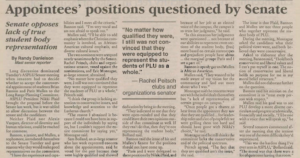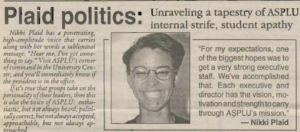How do you handle being the “first” or the “only”?
Nikki Plaid ’96 (full oral history interview here)
Born and raised in Las Vegas as a Lutheran, Nikki Plaid found PLU naturally through her family and her pastor. Her first night at PLU was the first night she had been out of state, and she was determined to make the most of her experience. In addition to picking up two majors (in political science and global studies) and a minor (in women’s studies), Nikki got involved with the Black Student Union, the Feminist Student Union, Harmony and Crossroads, and ASPLU, working her way up the ranks from senator to vice president to president. By the time she was a senior, she was the first openly lesbian-identified person to hold the role of ASPLU President, while continuing to moonlight as a successful student and tireless activist.
Looking back on it all now, Nikki is surprised that she had any time to study.
She also wonders how much of her calendar-cramming had to do with the need to be “the right kind of lesbian,” especially as a Black, feminist lesbian under great scrutiny from all corners of campus.
“Nikki was and is an extraordinary person,” Beth Kraig will tell you. “And then of course, people are going to be saying, well, Black-identified, well, that hasn’t happened often at PLU. Queer-identified — oh my gosh! So there was just like a double spotlight. And female-identified, because quite frankly, male leadership had been kind of the PLU history. Right down into student government and other facets of how the university ran. So I think for Nikki there was this, I would guess, this sense that you are an ideal.”
It came as no surprise to anyone when, upon graduating, Nikki fulfilled her dreams of working in Washington, DC. She worked on campaigns and as a staff assistant on Capitol Hill, and also joined the Lesbian Avengers, a direct action group famous for hosting Dyke Marches (she planned two of them herself) and eating fire.
To this day, she credits her experience in student government with preparing her for the challenges of working as a DC organizer. Between her campus activism—which had entailed protests, postering, marches, and more—and her organizational leadership, she was intimately familiar with the challenges of swimming against the current, devoting herself wholly to a diverse slate of causes, and being relentless in her pursuit of justice.
Joining the BSU her first year at PLU felt “so right and so necessary,” Nikki said. The group served as a source of support and embodied an activist ethic that helped her see “how easy it was” and that “we needed queer activism.” From there, she joined her other social justice organizations. But she knew she was still fragmenting herself—choosing which aspects of her identity to highlight based on the context she was in at the time.
“Each of those identities [Black, feminist, lesbian] was very real and very true to who I was… I don’t know that I allowed myself to fully be all of them.”
As she gained visibility on campus, too, the attacks on Nikki only increased. She recalls dreading each Friday, when new editions of The Mast would hit stands and she would see what she was being criticized for that week. (Her appointment of two queer-presenting people to the university’s Long-Range Planning Committee caused a particularly large scandal in the paper, despite the fact that they were the only two people who expressed interest in the role.)

Students react to Nikki’s appointment of two queer-presenting students to the Long Range Planning Committee.
It wasn’t long before the confines of a small institution began to feel too insular. Many of the conversations on campus surrounding queerness — even those in Harmony — were wearing a deep groove of “I’m a Christian, and you’re a sinner,” without room for nuance or reconciliation.
“Like, you know, from your own colleagues, from the Board of Regents, from students, you know, student parents writing in. It just wore thin,” Nikki said. “Wore real thin.”
Once she graduated, she felt she could spread her wings. She was able to spend more time in all-queer groups and learn about intracommunity and intersectional issues. And she learned, eventually, to negotiate the aspects of her identity that people had treated as contradictory (her faith and her queerness), as well as the art of honoring all her identities at once.



